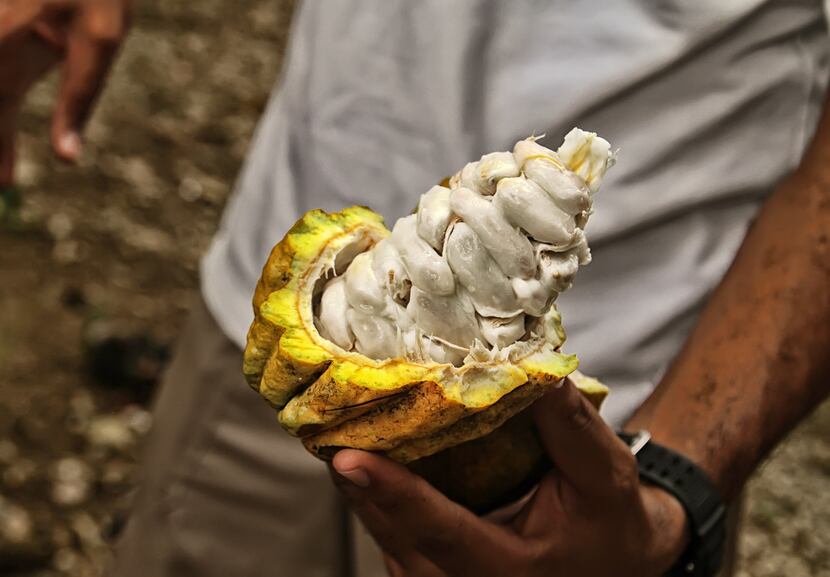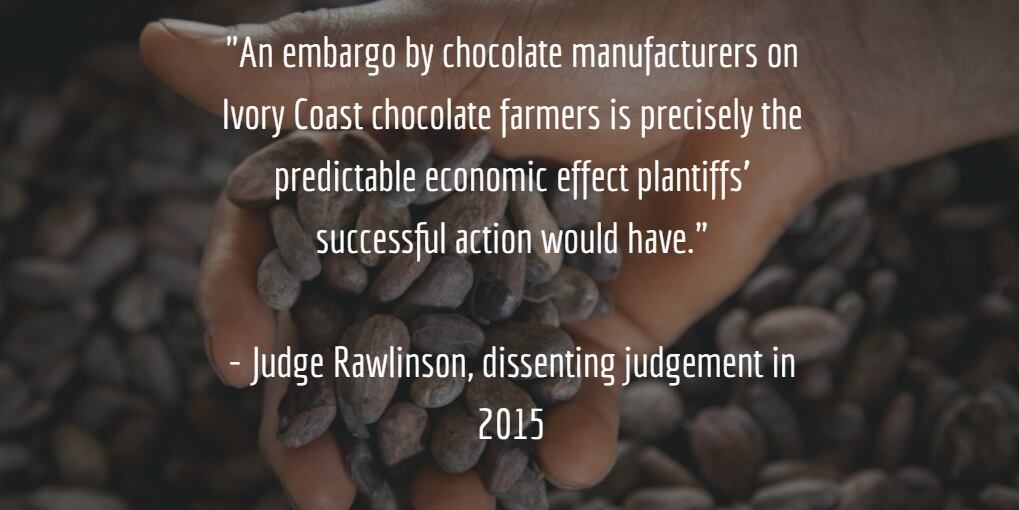The class action lawsuit, initiated in 2005, will be heard in federal court in January 2017 in the cocoa and chocolate companies’ last bid to dismiss the case before the parties prepare for trial.
The court will finally decide following a hearing on January 9, 2017 whether to dismiss or proceed after numerous challenges to have the case thrown out.
Cargill says the lawsuit is “without merit”, while ADM told us it had improved cocoa sustainability during its time in cocoa and chocolate. Nestlé did not respond to our request for comment.
‘Huge implications’
Terrence Collingsworth, executive director of International Rights Advocates, told ConfectioneryNews the class action could have “huge implications” for the chocolate industry.
"What it means is you can't take the head in the sand approach to your supply chain. That if you know that you're using child slaves, then you are legally responsible for it and you can no longer simply say: 'we're just buying the stuff’."
Cargill: Lawsuit ‘without merit’

Pete Stoddart, media relations director at Cargill, said: “As we have stated previously, Cargill continues to believe the allegations in the lawsuit against it are without merit and accordingly, Cargill has asked the court to dismiss the lawsuit against it.” He referred to the company sustainability program, the Cargill Cocoa Promise, launched in 2012. It estimates a third of its cocoa volumes were from certified sources in 2015 and expects sustainable volumes will reach 45% by 2018.
International Rights Advocates is hoping the case will force the industry’s hand to stamp out child labor in its supply chain.
"There needs to be a major restructuring of how the industry operates. It's been my experience in other sectors that the minute companies must do this, they can,” said Collingsworth.
The human rights lawyer has been fighting Alien Tort Claims Act cases against large companies such as Walmart, Exxon and Chiquita since the 1980s.
‘You either fix it or buy your cocoa somewhere else’
The lawyer is anticipating more supply chain cases against the chocolate industry and says lawyers are also exploring taking legal action under the Trafficking Victims Protection Act of 2000.
“I think the cocoa sector itself is like shooting fish in a barrel - there's no question that this [forced child labor] is going on."
Collingsworth alleged that most cocoa and chocolate companies acknowledge child labor may exist in their supply chains and claim to be rolling out programs - however, hazardous child labor numbers in cocoa continue to rise to around 2.03m in Ghana and Côte D’Ivoire.
But, what if companies have sustainability programs in place for part of their supply chain that they hope to scale up? Does that offer some protection?
“You can’t have it both ways,” said Collingsworth. “You can't say you're not responsible for child labor, but someday you're going to fix it. You have two choices: You either fix it or you buy your cocoa somewhere else for a lot more money."
"… There’s no child slavery light - either you are going to fix it and take responsibility for it or you can't be the beneficiary and profit from it,” he said.
ADM responds
Jackie Anderson, ADM media relations, said her company sold its cocoa and chocolate businesses to Olam and Cargill, respectively, in 2015 "In the 18 years that we participated in those industries, we worked independently and with fellow stakeholders to help improve the quality and sustainability of the global cocoa supply, and the lives and livelihoods of growers and communities along the value chain," she said.
Why these three companies?
International Rights Advocates says it chose to pursue Nestlé, ADM and Cargill because they are among the largest companies sourcing cocoa and have some “measure of control”.
Commitments to scale up

Some major chocolate and cocoa companies have committed to sourcing fully sustainable cocoa by a specified date. Mars, Ferrero and Hershey plan to source 100% certified sustainable cocoa by 2020, while Barry Callebaut hopes to covers its entire supply by 2025. Cargill, Mondelēz and Nestlé have signaled intent to scale up their own company cocoa programs, but have not specified a date for all volumes to be covered.
“So, if you have a boutique cocoa company that's dabbling a little bit in buying some cocoa from Côte D'Ivoire, they wouldn't have the power or leverage to make some real change in Côte D'Ivoire - although one could argue they are better placed to set up a small operation that would be child labor free,” said Collingsworth.
Asked why other large chocolate and cocoa companies were not part of the lawsuit, he said: "We very well might add other companies that are either based in the US or that have enough presence here to allow us to assert jurisdiction over them.
“That's just purely a legal strategy question. It so happens that the evidence that we had and the research we were able to do at that time correlated to these three companies."
He added that US courts were becoming less willing to allow suits against foreign companies, so it chose US-based firms.
Scope of the action: Six claimants but more could fit the class
The class action now has six claimants that were allegedly trafficked as children from Mali into Côte D’Ivoire in the 1990s and forced to work unpaid on cocoa farms for 14 hours a day.
Collingsworth said the class would cover any child who was trafficked from Mali into Côte D’Ivoire to work in cocoa.
International Rights Advocates unearthed the six alleged cases by interviewing around 100 children in Côte D’Ivoire.
"We selected from people we interviewed, kids whose stories and the facts made sense. They were not so damaged that they were terrorized by talking about what happened because we needed people who could be witnesses,” said Collingsworth.
The claimants allege horrific torture at the hands of their captors. One says he witnessed guards cut open the feet of children who tried to flee and another claimant says guards forced failed escapees to drink urine.
But these claims may be disputed by the companies and International Rights Advocates must still prove that the children worked on plantations supplying the defendants Nestlé, ADM and Cargill.
"Our evidence is that our class representatives worked for one or more of the defendant companies,” said Collingsworth.

West African cocoa embargo?
A dissenting judge in an earlier Court of Appeals ruling in the case said an embargo on cocoa from West Africa in the US, the world's largest chocolate market, was possible if the case succeeded.
Could that be harmful to the millions of farmers dependent on the cocoa crop?
Sako Warren, executive secretary of the world’s largest group representing cocoa farmers the World Cocoa Farmers Organization (WCFO), told this site: "I don’t think it's going to be a good idea to ban cocoa exportation from specific countries as a result of the outcome ... We should find a way to work together to avoid similar situations in the future.”
Collingsworth said International Rights Advocates would reassess its strategy if the impact of the case proved harmful to farmers.
“But I believe the companies could - and they say they can - fix their supply chains so they are not using child labor.
"If they are ordered to do it rather than merely promising they will do it, then that will incentive them to make the changes we all know could be made,” he said.
Imports already illegal?
Last year, new US legislation removed a 86-year old exception in the U.S. tariff code that banned imports from slave labor except when goods could not be manufactured in sufficient quantities in the US to meet domestic demand.
Revised US tariff code

"All goods, wares, articles, and merchandise mined, produced, or manufactured wholly or in part in any foreign country by convict labor or/and forced labor or/and indentured labor under penal sanctions shall not be entitled to entry at any of the ports of the United States, and the importation thereof is hereby prohibited, and the Secretary of the Treasury is authorized and directed to prescribe such regulations as may be necessary for the enforcement of this provision."
- 19 U.S. Code § 1307 - Convict-made goods; importation prohibited
Chocolate firm Equal Exchange previously called the rule a “loophole” that allowed cocoa possibly procured via the worst forms of child labor in West Africa to enter the US.
Collingsworth alleged the industry had successfully lobbied to preserve the exception clause in 2008 by saying they were taking steps to address their supply chains.
"They’ve never said it can’t be fixed, they've always said we are going to fix it,” said Collingsworth.
The exception has now been abolished, but it was in place when the six claimants in the Nestlé, Cargill and ADM case allegedly worked as slave laborers.
“Now we could take other measures to ban the importation of the products if we wanted to - or anyone could - but for the purposes of our clients and the people who have been enslaved [before last year] we still have lots of children that were enslaved during the period that these companies did not make those changes,” said Collingsworth.
Royal Dutch Petroleum case
Nestlé USA has moved to dismiss the case and will argue at the January 9, 2017 hearing that the US does not have jurisdiction.
It is relying on a Supreme Court decision in Kiobel v. Royal Dutch Petroleum that suggests conduct aboard must “touch and concern” the US with “sufficient force” for there to be jurisdiction.
Collingsworth argued: “The decisions that caused this [child slave labor] to happen were largely made in the US . The effects of this are felt in the US, including on a competitive basis with companies that are not using child slavery."
He anticipates the latest calls for the case to be thrown out will be the last. "They are done now - this is it for trying to dismiss the case on legal grounds."
International Rights Advocates has issued its response to the companies’ latest bid to dismiss the case. Nestlé, ADM and Cargill will be able to respond on December 19 before the court decides whether to procced or dismiss the case.
“If we lose, that ends the case and we have right to appeal,” said Collingsworth. “If we win, the case isn’t over and they don’t get to appeal until the entire case is over. If we win, we are getting ready for trial."
Following the hearing in the federal district court in Los Angeles on January 9, 60-90 days would be common for the judge to issue a decision, said Collingsworth.
